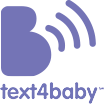Learn More About Your Pregnancy
Dangers of Secondhand Smoke to Your Baby
Q:
My baby just can't get over a cold when she gets one. I keep thinking it is because her father smokes around her. Can breathing in secondhand smoke make my baby have a harder time getting over a cold?
Yes
Correct!
Babies and children of people who smoke cough and wheeze more, and have a harder time getting over colds. Secondhand smoke can cause other symptoms, including stuffy nose, headache, sore throat, eye irritation, and hoarseness.
No
Incorrect!
Children of smokers cough and wheeze more and have a harder time getting over colds. They miss many more school days too. Secondhand smoke can cause other symptoms including stuffy nose, headache, sore throat, eye irritation, and hoarseness.
What is secondhand smoke?
Secondhand smoke is the smoke a smoker breathes out, and smoke that comes from the tip of burning cigarettes, pipes, and cigars. It contains about 4,000 chemicals. Many of these chemicals are dangerous – more than 50 are known to cause cancer. Anytime babies or children breathe in secondhand smoke they are exposed to these chemicals.
Secondhand smoke during pregnancy
If you smoke or are exposed to secondhand smoke when you’re pregnant, your baby is exposed to harmful chemicals too. This may lead to many serious health problems, including:
- Miscarriage.
- Premature birth (born not fully developed).
- Lower birth weight than expected (possibly meaning a less healthy baby).
- Sudden infant death syndrome (SIDS).
- Learning problems and attention-deficit/hyperactivity disorder (ADHD).
Your baby's exposure to secondhand smoke
Infants have a higher risk of SIDS if they are exposed to secondhand smoke. Children exposed to secondhand smoke have a higher risk of serious health problems, or their health problems may become worse. Children who breathe secondhand smoke can have more:
- Ear infections.
- Coughs and colds.
- Respiratory problems, such as bronchitis and pneumonia.
- Tooth decay.
Children with asthma are especially sensitive to secondhand smoke. It may cause more asthma attacks and the attacks may be more severe, requiring trips to the hospital.

